Does Salt Kill Weeds? Types, Methods & FAQ
-

- Last updated:
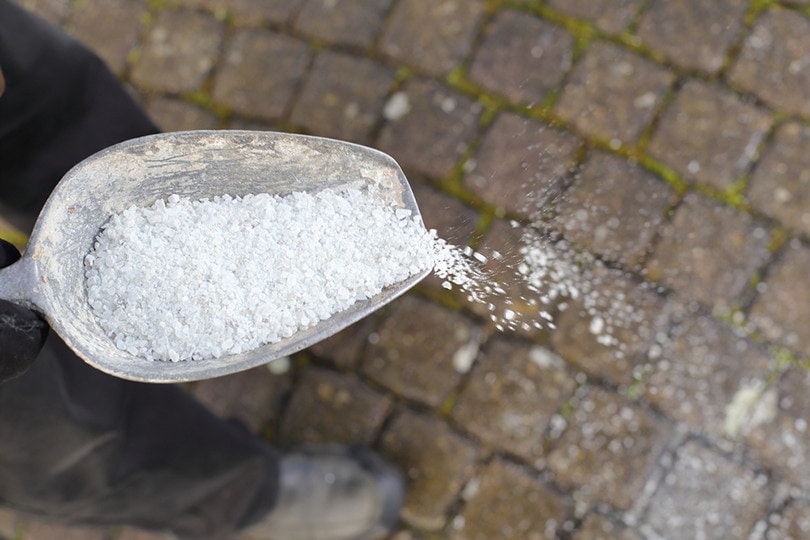
Humans have long been sharpening their weed management skills, but unfortunately, weeds keep sprouting, testing our patience to the core and forcing us to invest in less conventional means—like using salt. This begs the question, can you really use salt to control weeds, or is it just a gimmick? The short answer is yes, salt does kill weeds.
This detailed article explores more on the topic to give you a better understanding of how this ingredient is useful for cracking down tough weeds in the garden.
How Does Salt Kill Weeds?
According to simple biology and chemistry, one of the properties of salt is to disrupt the osmotic balance between root cells and water molecules in the soil. Salt creates a region of high concentration in the soil, pulling out or preventing water absorption. As days wear on, the plant will dehydrate, wilt, and die.
Alternatively, when salt (NaCl) dissolves in water, it releases sodium and chloride ions. The latter accumulates in plants to toxic levels. On the other hand, too much chlorine leads to signs of marginal scorching, weak plants, and death.

How Long Does It Take for Salt to Kill Weeds?
On average, salt takes around 10 days to decimate weeds completely. However, its success rate will depend on a number of factors, including:
Weather
Salt is a soluble compound and thus affected by the weather. Rain, mist, snow, or fog dissolve and carry salt away from weeds, so the method will be less effective in such conditions.
Likewise, in dry weather, salt crystals will clump together on the surface uselessly.
For it to work, salt needs moderate moisture to dissolve and remain around the weeds’ roots.
Types of Weeds
Salt is effective for small shallow-rooted plants with broad leaves. However, these are limited to the amount of water they take in. Thus, disrupting their fragile absorption patterns kills them within a few days.
The process is even faster in young weeds with broad leaves. This is because broad leaves accelerate wilting through a high transpiration rate.
Salt will be less effective on deeply-rooted, woody weeds. The plants can survive in toxic conditions thanks to well spread out roots that will channel into freshwater, reducing the concentration of harmful ions.
If you want to kill these weeds, apply generous heaps of salt directly at the base of the plant. Then, continue doing the same every month to overwhelm the plant with an unbearable salt concentration.
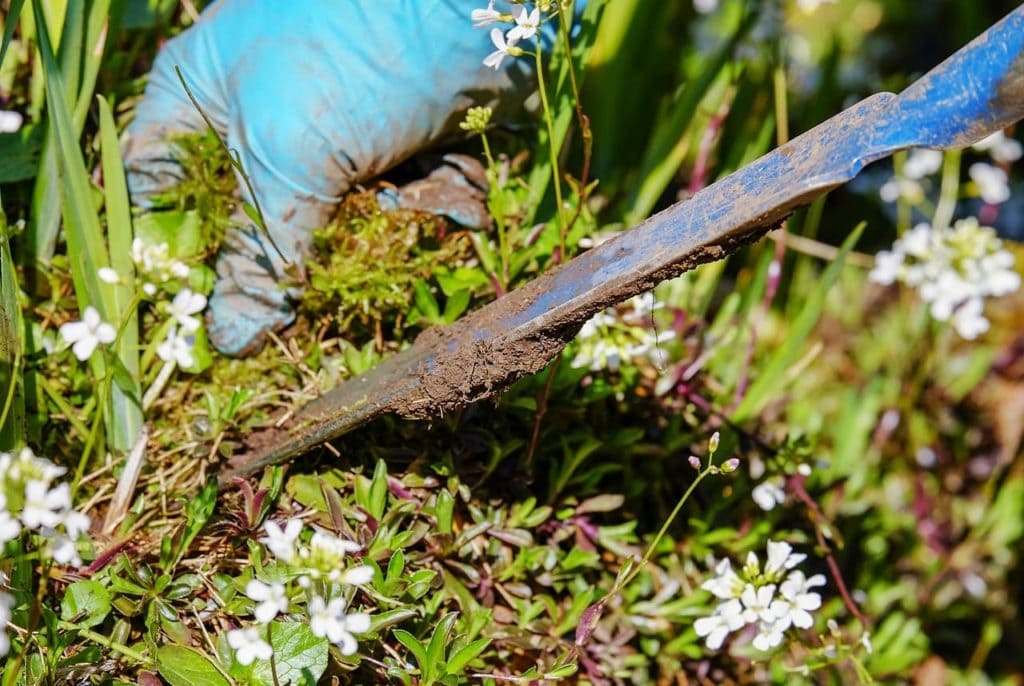
Time of Application
Salt has great results when used on young, sprouting weeds. These small plants are fragile and susceptible to harsh conditions. Therefore, they will succumb to small doses of salt.
The best time to find young weeds is in the early spring or summer when weeds are emerging, also at the onset of the rainy season in tropical countries.
Environment
Despite wanting salt to be a universal weed killer, it may not work in some areas. This home solution performs optimally in areas with compact soil around driveways, pathways, and in between rock crevices.
You have to use copious amounts of salt on fertile and well-drained soils with sandy particles. In these soils, water freely drains down and will carry salt away before killing weeds. Therefore, using salt in large quantities will considerably increase the chances of success.
Which Salts Are Good for Killing Weeds?
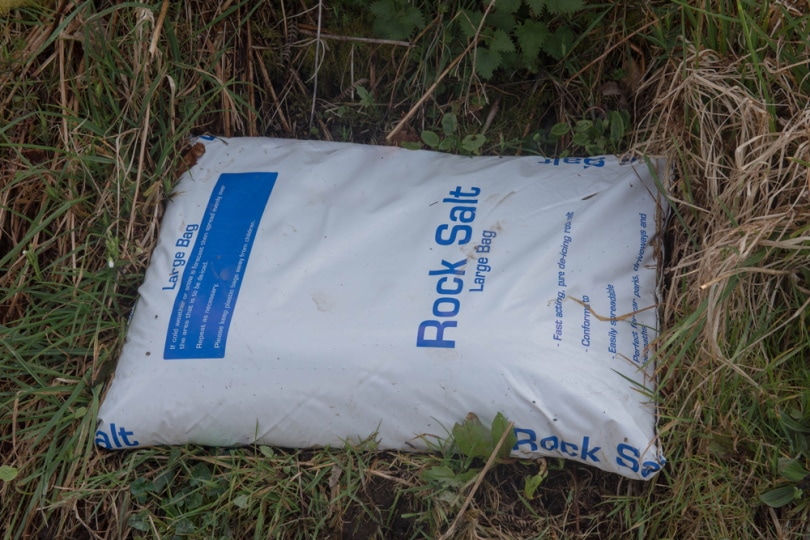
There are two types of salts gardeners use to kill weeds; rock and iodized table salt. Rock salt is impure, gray in color, and contains traces of calcium and magnesium. It is safe for consumption and dangerous for weeds.
Purifying rock salt produces table salt, which is white and has smaller crystals. Iodine is often added later, earning it the name “iodized table salt.”
Rock and table salts are natural herbicides. But on an individual scale, table salt’s small crystals have better properties than chunky rock salt crystals. The former easily dissolve in water or moisture, hence acting on weeds at a faster pace.
Use hammers or grinders to break down large pieces of rock salt before scattering them in your garden.
Using Salt to Kill Weeds
Method 1: Sprinkle Table Salt Directly onto Weeds
This is the easiest way of using salt as a homemade weed killer. It involves pouring fine salt particles onto a dish to sprinkle at the base weeds with your hands. This quickly saturates a large area with enough salt to destroy most weeds.
Note: This method kills almost everything and should only be used in areas with no valuable plants, such as pathways.
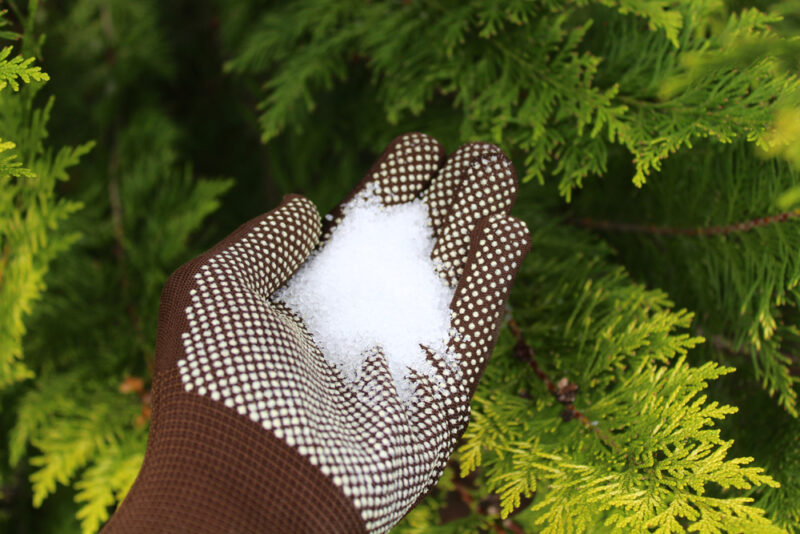
Method 2: Mix Salt, Water, and Vinegar Together
The deadly combination of salt, water, and vinegar is a tough weed killer. The strength of the solution depends on the type of weeds and the physical condition of the soil. Regenerative perennial weeds require a highly concentrated solution to destroy deeply anchored roots and tubers.
Annual weeds are less notorious and die off every fall or at the onset of the dry season. A mild solution of salt will starve the plant of water.
If you are applying salt to a healthy garden with flowers and vegetables, a mixture of salt to water in a ratio of 1:2 is just right. This means that for every cup of salt, use two cups of water.
Use a more concentrated solution of salt to the water of 2:1 or 3:1 when soil health not an issue. This mixture is very harmful and will destroy all plants and microorganisms in the soil.
To use this mixture, boil some water and dissolve in salt in the correct ratio. Funnel the mixture into a spray bottle and add a few drops of vinegar, then shake well and close. Horticultural vinegar has acetic acid, which kills young leaves.
Besides, vinegar reduces the surface tension between salt, water, and leaves. This improves salt solution effectiveness as you spray it on the leaves.
You can also pour an eighth of a cup of the hot water mixture directly above each weed or grass turf. If you don’t like the idea of hot water, use warm water instead.
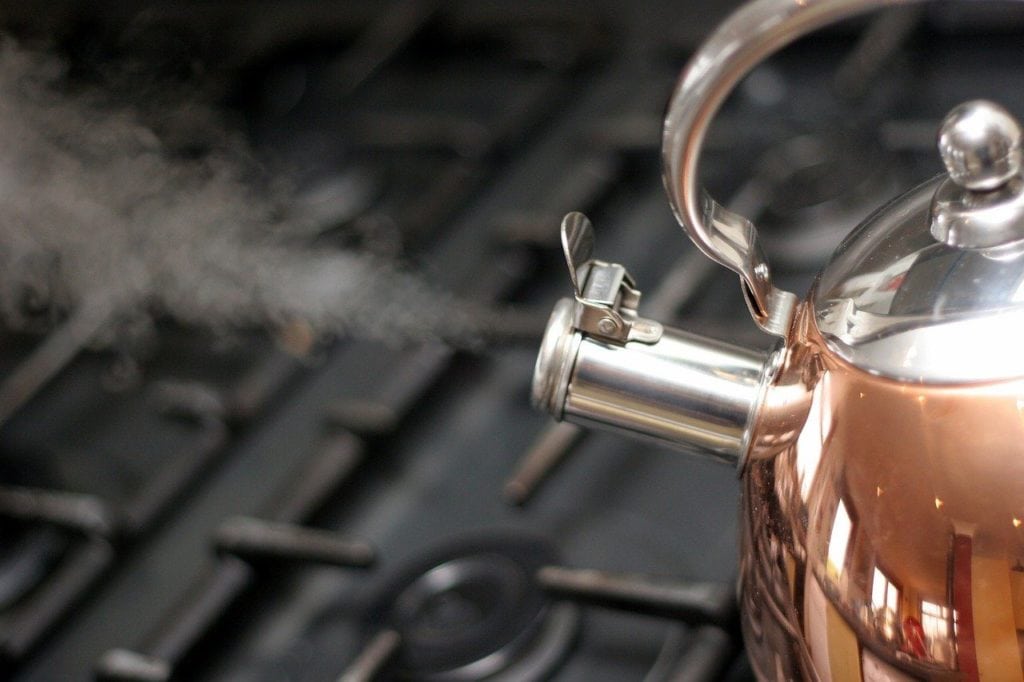
Does Salt Kill Weeds Permanently?
Salt works by disrupting the water intake of a plant. As the weeds wilt, it dies off permanently. Furthermore, this DIY weed killer prevents new growth.
Can Salt Kill Moss?
Moss is a small non-flowering green weed that thrives in moist conditions protected by walls, shrubs, or trees. In favorable conditions, mosses spread out rapidly, covering a large area.
Controlling moss with salt is possible in most species except Schistidium maritimum. This highly sophisticated and resilient plant thrives on salt water near coastal areas. Using salt to kill it is useless because it has developed a high tolerance against salt.
Salt attacks moss’ living cells, denying them the ability to absorb water. This kills them.
Pros of Using Salt as a Natural Weed Killer
- Cheap – Salt is a readily available resource that is cheap to acquire. A ton of salt in the USA retails as low as 220 USD per ton. This is enough salt to take care of modern gardens.
- Convenient – Compared to uprooting and plowing, salt is convenient and faster. You only need to sprinkle it over the affected area. Dissolving and spraying are easy.
- Effective in Moist Conditions – Salt is a go-to method when you want to kill weeds permanently. It is effective against small, shallowly rooted, and leafy weeds in moist conditions.
- Eco-Friendly – Most manufactured herbicides contain dangerous levels of glyphosate, atrazine, and paraquat. Environmentally, they kill microorganisms, rearrange well-harmonized ecosystems and change animal habitats. Salt, as a replacement for poisonous herbicides, and does nothing with dire environmental consequences other than killing weeds in a specific area.
- Occurs Naturally and Everywhere – Using salt to kill weeds is using nature on nature with no complex manufacturing process and environmental pollution.
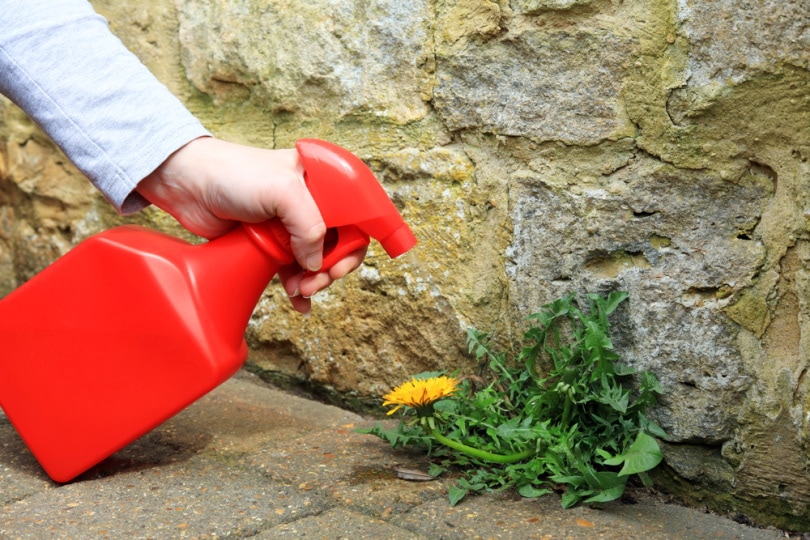
Cons of Using Salt on Weeds
- Salt is Costlier When Applied on a Large Scale – Typically, an acre of land requires roughly 20 tons of salt to kill weeds. You could spend over $4,000 on a single weeding round. Weeding the same acre of land with herbicides is projected to be around $240, almost 20 times cheaper than salt.
- Salt Sterilizes Soil –Salt kills most plants it comes to contact with and stays in the soil for a long time. For these reasons, it can sterilizes soil and render it useless.
- Doesn’t Work With Well Developed Woody Weeds
- Unfortunately, salt is not effective on woody, hardy weeds.
 Final Thoughts
Final Thoughts
If you are looking for a natural, cheap and effective way of killing weeds, look no further than your kitchen. Salt is one of the best alternatives to chemical herbicides that kills weeds through contact. Despite its descanting characteristics, salts will stick just below the surface for a long time to keep weeds away from your beloved garden, patio, driveway, and pathways.
Featured Image Credit: riopatuca, Shutterstock
Contents


